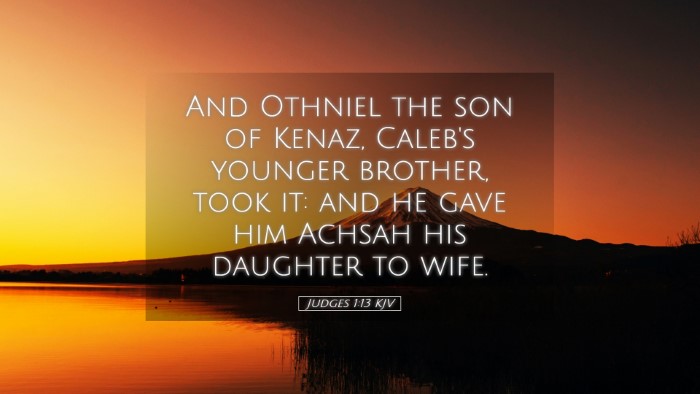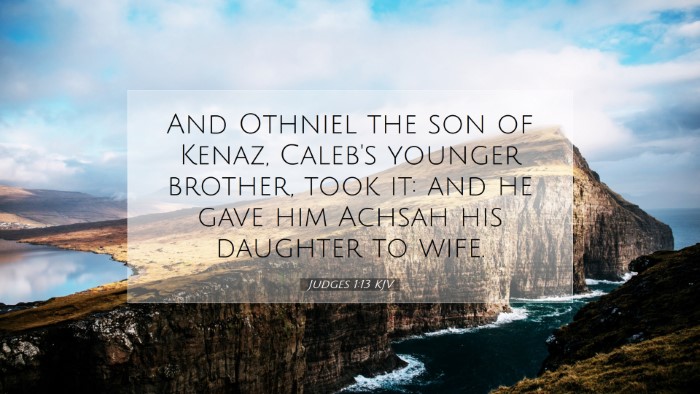Commentary on Judges 1:13
Bible Verse: Judges 1:13 - "And Othniel the son of Kenaz, Caleb's younger brother, took it: and he gave him Achsah his daughter to wife."
Contextual Overview
The Book of Judges presents a critical period in Israel's history, characterized by cycles of apostasy, oppression, repentance, and deliverance. In this chapter, the narrative shifts from the initial conquest of the land by Joshua to the actions of the tribes of Israel. The mention of Othniel highlights the importance of strong leadership and divine empowerment in overcoming challenges.
Insights from Public Domain Commentaries
Matthew Henry's Commentary
Henry emphasizes the significance of Othniel as a figure of valor and faith. He writes, “It is a great honour to take a city, but to take a city in the name of the Lord and for His people is far more honourable.” Othniel's victory is not merely a military achievement; it is a fulfillment of God’s promise to His people. Henry explains how Othniel, being a nephew of Caleb, is seen as an extension of Caleb's brave spirit, thus linking the familial legacy of courage with divine providence.
Henry also highlights the gift of Achsah, Caleb’s daughter, as a reward for valor. This act symbolizes not only personal reward but also the blessing that follows obedience and courage in God’s mission. This intertwining of martial success and familial alliances illustrates the unity and solidarity that was essential for the Israelite tribes during their settlement.
Albert Barnes' Notes on the Bible
Barnes draws attention to the characteristics of Othniel, qualifying him as a “hero” not just in terms of physical prowess but as a man of faith. He points out that the passage reflects on the principle that God's favor is bestowed upon those who act on faith. Othniel’s successful capture of the city illustrates how divine assistance accompanies the efforts of those who step out courageously to claim their inheritance.
Moreover, Barnes notes the transaction of Achsah as a significant cultural practice that highlights the interplay of military success with social and familial bonds. Achsah herself later plays a role in securing inheritance and blessings, showcasing the faith and initiative that reflect her father, Caleb’s spirit.
Adam Clarke's Commentary
Clarke introduces a detailed examination of the names and relationships within the text. He points out that Othniel, being Caleb's younger brother, suggests a strong kinship bond that would have fostered loyalty and courage among the Israelites. Clarke reflects on the importance of familial relationships in the context of leadership and community solidarity.
Clarke also notes the prophetic aspect of Achsah’s request for water, which signifies the abundance and prosperity that follows faithfulness and victory. He remarks that Othniel’s leadership and the blessings from both God and human relationships were integral to the stability and continuity of Israel’s mission in occupying the promised land.
Theological Reflections
This verse invites deeper contemplation regarding the intertwining themes of divine sovereignty, human agency, and familial alliances in the context of God’s plan for Israel. It reflects the essential role of leaders who, emboldened by faith, rise to seize opportunities for fulfilling God’s mandates.
The giving of Achsah to Othniel encapsulates the biblical principle of blessing through obedience and righteous action. The passage encourages reflection on how personal relationships within the church and community are essential for mutual support in Christian living and mission.
Applications for Today’s Ministry
- Courage in Leadership: Pastors and leaders should draw inspiration from Othniel's example, striving to lead with faith and assuredness in God’s promises.
- Community and Family Bonds: The importance of cultivating strong relationships within the community is crucial for collective strength and purpose.
- Faithful Pursuit of God’s Call: Just as Othniel acted upon God’s calling, modern believers are encouraged to pursue their God-given tasks with determination and faith.
- Reward of Faithfulness: The reward given to Othniel serves as a reminder that faithfulness in service often leads to blessings — both spiritually and relationally.
Conclusion
Judges 1:13 serves as a profound reminder of the powerful interactions between human effort and divine assistance in the unfolding narrative of Israel. The insights garnered from historical commentaries elucidate the timeless principles arising from this text, encouraging faithful living, courageous leadership, and the vital connections formed within the community of believers. As we reflect upon this passage, may we find inspiration to faithfully navigate our own journeys in alignment with God’s intentions for our lives and communities.


